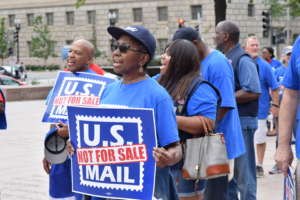Lawmakers challenge ‘floundering’ USPS privatization plan amid growing opposition
With a majority of the House and nearly half the Senate pushing back on the Trump administration's plan to privatize the Postal Service, postal employees across the...
 With a majority of the House and nearly half the Senate pushing back on the Trump administration’s plan to privatize the U.S. Postal Service, employees across the country rallied Monday, calling on their lawmakers to scuttle the proposal.
With a majority of the House and nearly half the Senate pushing back on the Trump administration’s plan to privatize the U.S. Postal Service, employees across the country rallied Monday, calling on their lawmakers to scuttle the proposal.
Mark Dimonstein, the president of the American Postal Workers Union, said a privately owned Postal Service wouldn’t be able to match the agency’s low rates and its universal service obligation to deliver to more than 157 million addresses six days a week.
“If the Postal Service is sold off to private corporations, people will or will not get mail based on whether somebody can make a quick dollar, and that’s wrong,” Dimonstein said at a rally in Washington — one of 140 events organized by postal unions on Monday.
Revenue for first-class mail, one of USPS’ most profitable products, declined by $134 million, or 2.2 percent last quarter. But USPS also reported $5.1 billion in shipping and package revenue — an increase of 10.2 percent. The Postal Service has enjoyed years of double-digit package growth.
Amid the rise of online retailers like Amazon, Dimondstein said USPS, despite its financial challenges, is “probably more important than ever.”
“If e-commerce is going to work for all of us, you have to have a public infrastructure to be able to deliver those packages and return those packages,” he said.
Del. Eleanor Holmes Norton (D-D.C.), a member of the House Oversight and Government Reform Committee, told postal employees that the Office of Management and Budget’s plan to privatize USPS marked a “new low” for the Trump administration, but pronounced the plan dead on arrival, based on conversations she’s had with Trump administration officials.
“Because of my place on the committee, they’ve already come to see me about this scheme. They’re floundering — that’s one of the reasons I say this isn’t going to get anywhere,” she said. “They really don’t know the agencies of the Postal Service, much less the federal government. They came to see me about the reorganization of the federal government, of which this is a part.”
Norton said the Trump privatization plan would eliminate door-to-door delivery, reduce the number of postal employees and reduce workers’ benefits.
Part of a larger reorganization
OMB announced its plans to privatize the Postal Service in June, as part of a larger government reorganization, which also includes plans to fold the Office of Personnel Management into the General Services Administration and the Executive Office of the President.
Norton also cited bipartisan opposition to postal privatization in Congress. At this time, 223 representatives (including 52 Republicans) and 42 senators (including five Republicans) have co-sponsored legislation that would block the Trump administration from selling off USPS.
“The constituents of our Republican colleagues need you just as much as I need you, and they know it. They know they are dependent upon postal delivery. They’re dependent upon the entire Postal Service. In fact, I predict that Republicans will be even more reluctant to go with this scheme, because they disproportionately represent constituents who live in rural areas,” Norton said.
With midterm elections looming, Rep. Brad Sherman (D-Calf.) urged postal employees to pressure their local representatives to weigh in against USPS privatization.
“I’ve got colleagues running for reelection who haven’t cosponsored HR 993. What the matter with them?” Sherman said. “They’ve got a few days to come on board, and if they don’t, there will be a day of reckoning by their voters in their district.”.
National Association of Letter Carriers President Fredric Rolando, in a statement, said the union would also question lawmakers on where they stand on postal privatization.
“We’re going to ask all candidates for the House and Senate — incumbent or challenger, Republican, Democrat or Independent — where they stand on this issue,” Rolando said.
Reform bills target retiree benefits
Both the House and Senate have introduced several postal reform bills in recent years. Most of these bills would end the Postal Service’s decade-long mandate to pre-fund postal retirees’ health benefits.
Last week, the Government Accountability Office forecasted that USPS would deplete its retiree health benefits fund by fiscal 2030.
While these legislative proposals have a broad backing of support from postal unions, lawmakers and the mailing industry, the National Active and Retired Federal Employees Association (NARFE) has opposed the bills’ provision requiring postal retirees to enroll in Medicare Part B.
Ron Watson, the National Association of Letter Carriers’ director of retired members, said the postal reform legislation is a “good start towards fixing the problem.”
“We’ve got to fix the pre-funding,” Watson told Federal News Network. “One way to fix the pre-funding is with current legislation, but it needs some tweaks, particularly with the Medicare Part B provision. That’s a big part of fixing the pre-funding.”
A group of private-sector mailing industry companies has also opposed the Trump administration’s plans to privatize the Postal Service.
The Coalition for a 21st-Century Postal Service, in a statement Friday, said the Postal Service’s “fiscal insolvency” puts 44 million rural addresses at risk.
“No private sector shipper would choose to serve our entire country and take on its great challenges to earning a profit, but the Postal Service does,” the coalition wrote.
According to a Pew Research Center poll conducted earlier this year, the Postal Service earned an 88 percent satisfaction rating, the highest of any government agency.
Copyright © 2025 Federal News Network. All rights reserved. This website is not intended for users located within the European Economic Area.
Jory Heckman is a reporter at Federal News Network covering U.S. Postal Service, IRS, big data and technology issues.
Follow @jheckmanWFED





